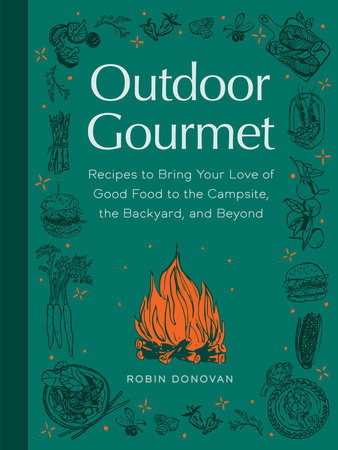Introduction Tent? Check. Sleeping bag? Check. Mosquito repellent? Check. Extra-virgin olive oil? Check.
Every spring, as throngs of outdoor adventurers ready their camping gear and ponder whether to head for the mountains or the desert, the coast or the woods, all I can think about is dinner.
Don’t get me wrong. I love the outdoors as much as the next guy. But I have to admit that for me the highlight of any camping trip is the food. Meals around the campfire are the pinnacle of my camping experience.
“Food snob,” my friends sneer, rolling their eyes, as I nix their dinner suggestions of canned franks and beans. Many of my friends, I’ve discovered, are among the majority of campers, who—while waxing rhapsodic about the pleasures of sleeping outdoors, breathing clean air, and communing with nature—have resigned themselves to eating unhealthy, unsatisfying foods in order to enjoy the great outdoors.
“It never occurred to me that you could cook anything really good at a campsite,” my friend Susan said to me. Susan swears that she and her husband ate macaroni and cheese out of a box every single night of a three-week camping trip.
Other friends share grisly tales starring soggy concoctions of canned meats and rehydrated vegetables, strange combinations of processed foods congealing on plastic plates, dishes with scary names like “Ramen Cheeseburger Soup” or “Cottage Cheese Cabbage Noodles.” How these people can stomach something called “Can-Can Quickie”—which, by the way, contains a can of something identified mysteriously as “luncheon meat”—is beyond me.
It’s not that my friends don’t appreciate a good meal. In fact, many of them are quite the foodies back home, in the convenience of their well-stocked, professionally equipped kitchens. A few are even considered geniuses of backyard barbecue. But drop them thirty miles from the nearest grocery store with a couple of pans, some aluminum foil, a camp stove, and a fire pit, and suddenly they’re like helpless kittens crying for a bowl of milk. “We’re hungry,” they whine. “Where are the hot dogs?”
But I have always subscribed to the “live to eat” philosophy of life—and of vacationing. After all, isn’t pleasure the whole point of a vacation? And isn’t eating delicious foods one of the greatest pleasures of all? More often than not, I’ve chosen travel destinations based on the menu offerings. Dreams of rich cheeses and flaky pastries propelled me to France. The promise of delicate pastas, chewy breads, and salty cured meats lured me to Italy. I ventured to Thailand for pungent peanut sauce and fiery coconut curry. My memories of Indonesia are animated by a parade of pancakes drizzled with palm sugar syrup, bowls of rich yellow rice, and platters of pork braised in sweet soy sauce. If my penchant for tasty food could so easily tempt me to travel all the way around the world, you can bet I’m not going to go tromping out into the California wilderness without something scrumptious to look forward to. So for many years, I simply avoided camping altogether. The reward just didn’t seem worth the effort.
Then one summer some friends dragged me on a camping trip to Pinnacles National Monument, a jumble of craggy peaks and natural caves bordering California’s arid Salinas Valley. “It’ll be fun,” they promised. “It’s really beautiful. You’ll like it.” I remained skeptical. But I nonetheless packed my borrowed camping equipment, put on a brave face, and squeezed into the car. We arrived at the campsite just before dusk and quickly set up our tents before it became too dark to see what we were doing. Once my sleeping arrangements were squared away, I wondered, “Now what? It’s too early to go to bed, but what the hell else are we going to do?”
I ventured out of my tent to find my friend Heida expertly building a fire. Sean was sitting at the picnic table, busily cutting vegetables. Piles of chopped onions, mushrooms, and brightly colored bell peppers grew in front of him. Then from the cooler he pulled out a container full of chunks of marinated chicken. I sat down with him, and we began threading the chicken and chopped vegetables onto bamboo skewers. Heida and the others joined us, one by one, until all of us were kebabing away. In no time, the piles of meat and vegetables were transformed into an artful stack of kebabs. Someone sliced some potatoes and onions; tossed them with olive oil, Dijon mustard, and fresh herbs; and bundled them into squares of aluminum foil.
Soon the foil packets hissed on the grill. The kebabs sizzled as their juices trickled into the fire. We all gathered around expectantly, poking at the fire with long sticks, sipping red wine from coffee mugs, breathing in the smells of wood smoke, browning meat, and herbs wafting up from the glowing pit.
Finally, dinner was served, and I can say in all honesty that it was one of the best meals I’ve ever had. There is just something about a meal that is prepared and consumed in the fresh air, under the twinkling stars, far from the bustle of everyday life, using only the most basic tools.
Meat tastes meatier, herbs brighter, vegetables earthier. My stomach happily sated, I slept a deep sleep that night, bundled in my cozy sleeping bag, cradled by the sounds of the outdoors.
Pinnacles is, in fact, a stunningly beautiful spot. The next morning, after a breakfast of scrambled eggs and home fries made from the packets of leftover potatoes from the night before, we set out on a long hike up the rocky trail, through the dark, damp caves, to the highest sun-baked peak. After a twelve-mile hike in blazing heat, we returned to camp with new appetites. More treats were pulled from coolers, and collective effort yielded another satisfying meal. That night, as I lay in my tent listening to the crackle of twigs made by wild pigs rooting in the woods around our campsite, I fully embraced my inner nature lover. If this was camping, I was all for it. I realized that the reward is, in fact, well worth the effort.
Since then I’ve camped—and cooked—at dozens of sites throughout the West. I’ve made bourbon-glazed chicken in the mountains, grilled steak tacos in the desert, and pan-seared tequila shrimp on the coast. More often than not, while my companions are debating where to go and what to do, I’m already busy planning the menu.
What I’ve learned is that outdoor cooking doesn’t need to be elaborate in order to yield stunning results. As I’ve discovered, the mantra of many a renowned chef has never been more appropriate: Good food, simply prepared, tastes good. Armed with quality ingredients and the recipes and advice in this book, even the biggest foodie will finally feel safe venturing out into the wild. Mother Nature kindly provides ambience any fine restaurant would kill for: Stars twinkle overhead, the flickering fire casts a romantic glow, and a cool summer breeze makes subtle background music. All you need to add is a well-stocked cooler, a few essential pieces of equipment, and a good meal plan, and you, too, can create top-notch meals around a campfire.
Your friends may resist your gourmet tendencies at first. But I guarantee that when dinnertime rolls around, snide comments will be silenced by the hungry crowd thoroughly enjoying the food. In the end, everyone will appreciate having a foodie along.
Copyright © 2006 by Robin Donovan. All rights reserved. No part of this excerpt may be reproduced or reprinted without permission in writing from the publisher.














